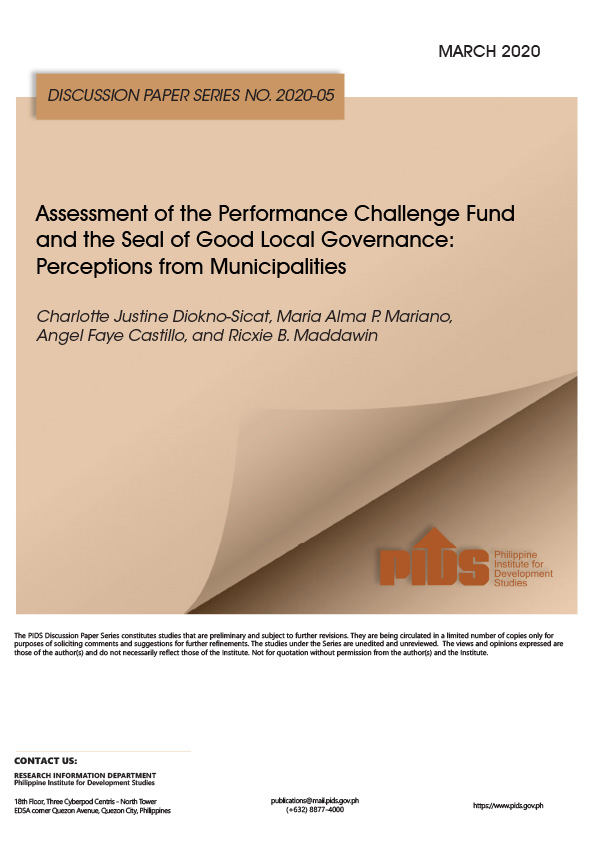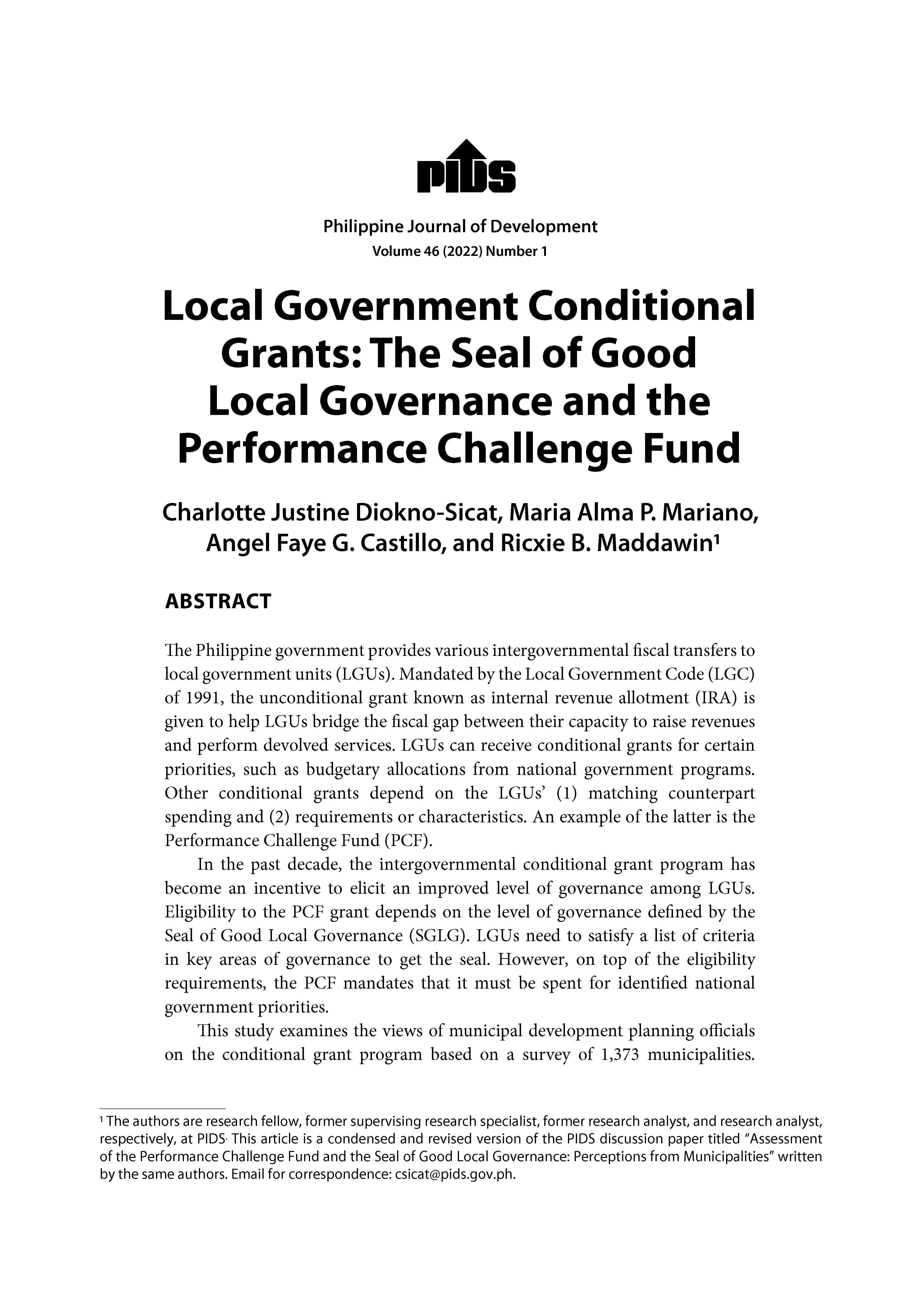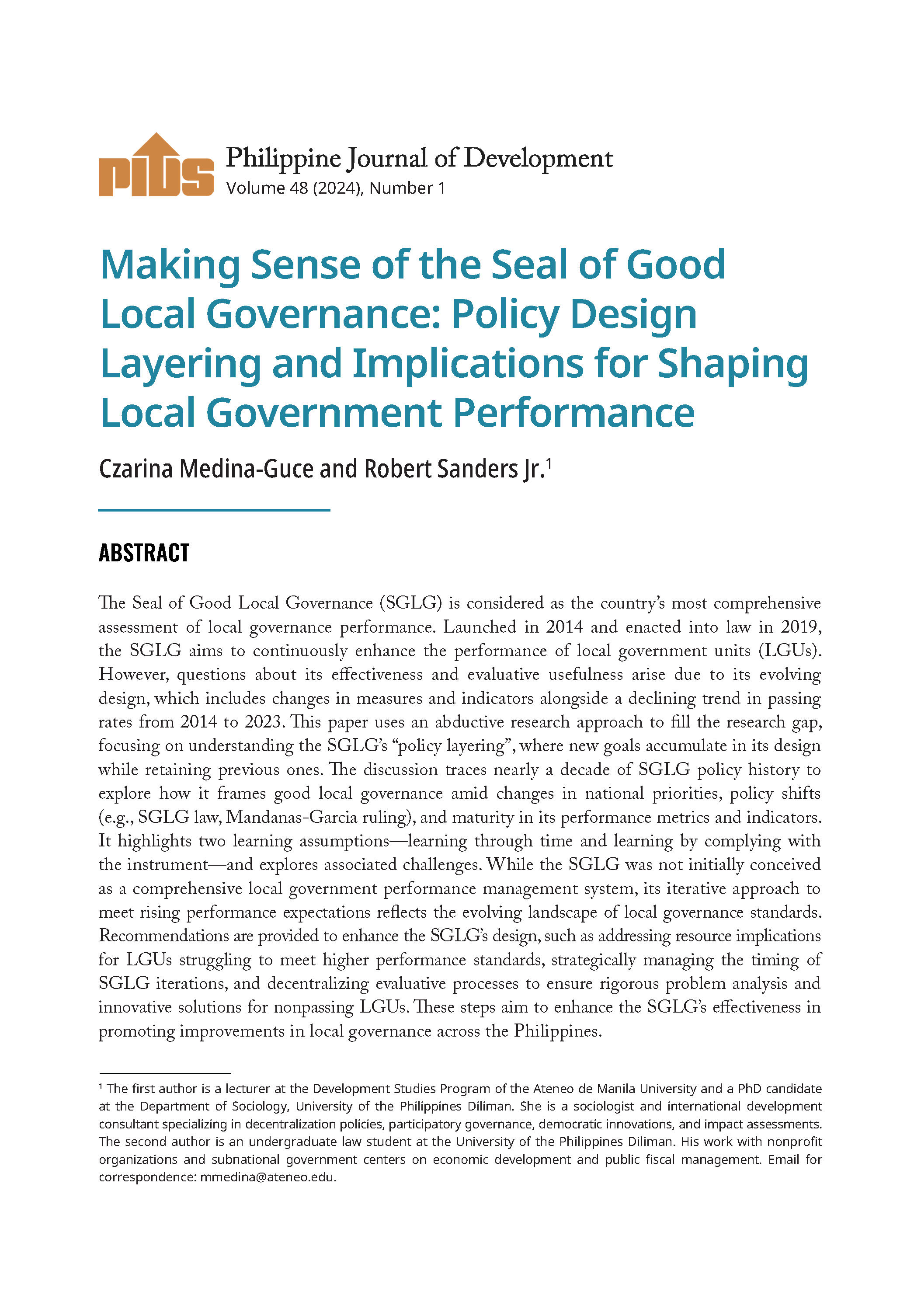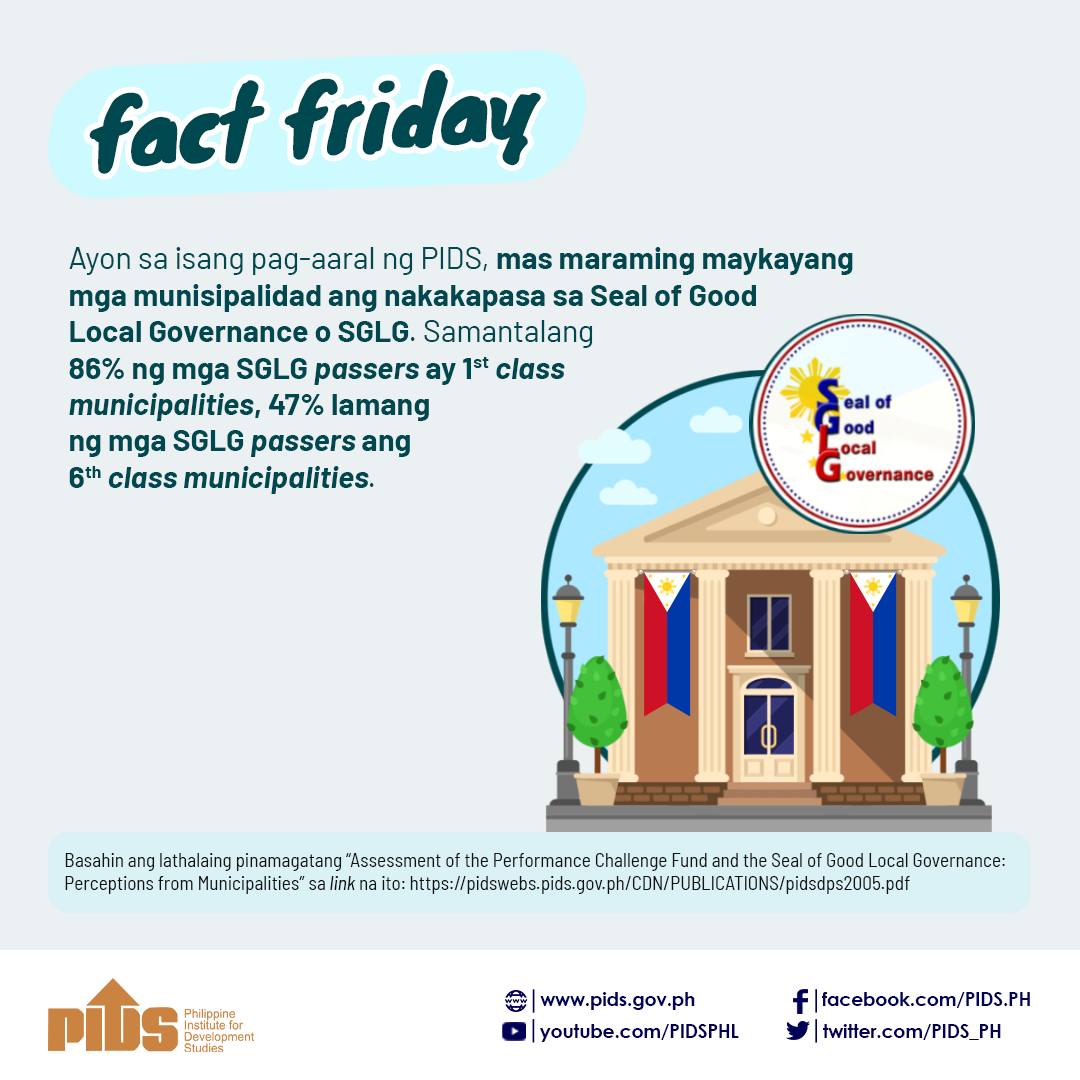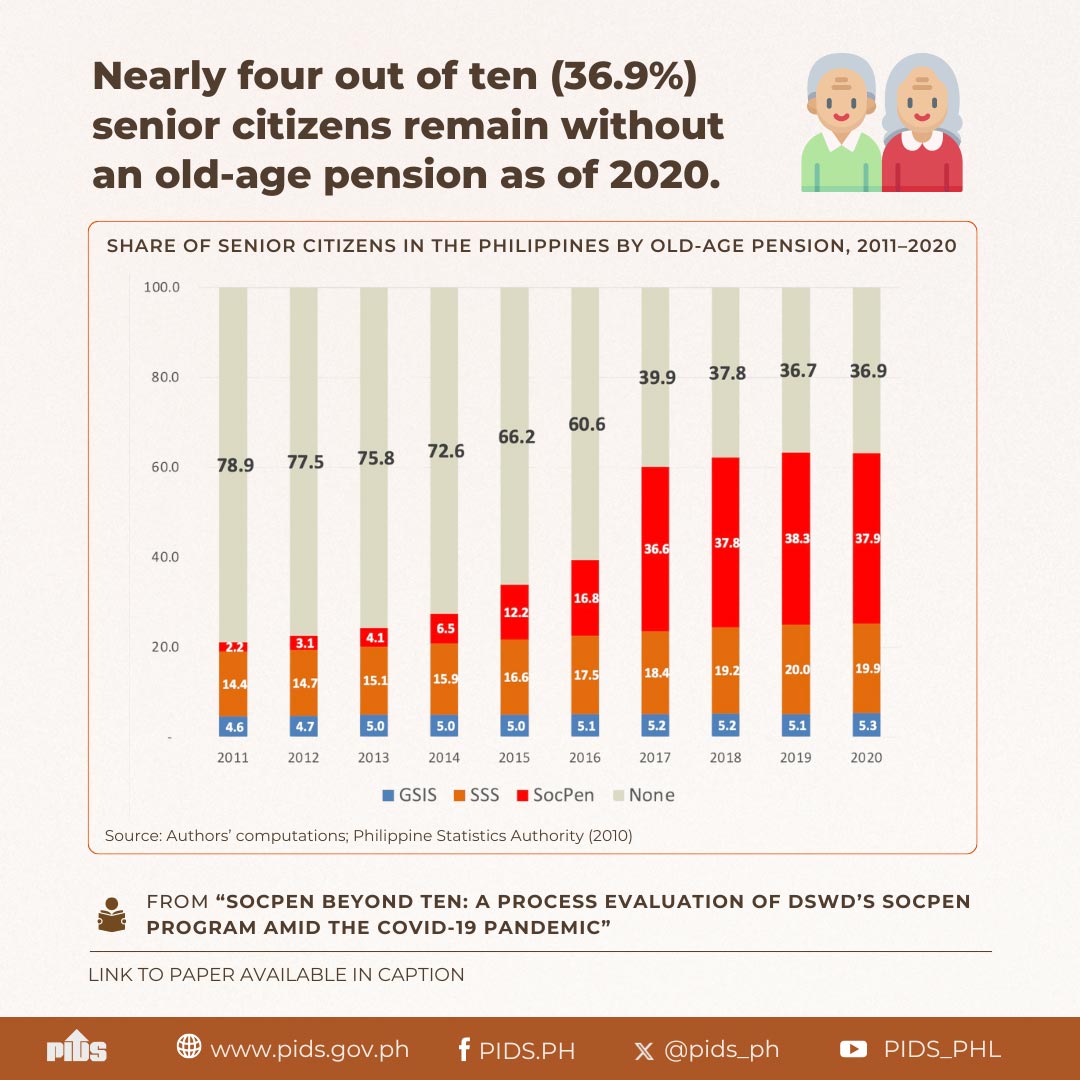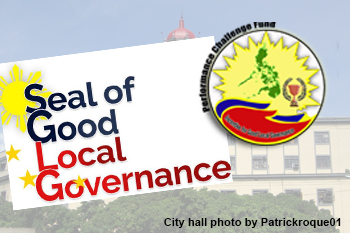
The government needs to revisit the objectives and designs of the Performance Challenge Fund (PCF) and the Seal of Good Local Governance (SGLG) to ensure that no local government unit (LGU) is left behind.
This, after a recent study of state think tank Philippine Institute for Development Studies (PIDS) revealed that more financially able municipalities qualify for the SGLG compared to poorer municipalities.
The PCF is a performance-based program that provides financial incentives to local governments for attaining a certain level of governance, while the SGLG is the performance assessment tool used to establish LGU eligibility for availing of the PCF. Both are implemented by the Department of the Interior and Local Government (DILG).
Based on a survey of 1,373 municipalities and data from the PCF portal, the study found that most LGUs belonging to the 1st to 4th income classes benefitted from the grant and a few municipalities in the 5th to 6th income classes.
“It is more likely that a rich municipality will be a PCF grant recipient than a municipality that is poor,” the study said. It noted that these findings are consistent with the SGLG data that showed that the larger proportion of passers for the program come from the 1st to 4th income classes.
Similarly, the SGLG’s Hall of Famers, or LGUs that received the Seal repeatedly, frequently came from the 1st to 4th income classes.
On the other hand, there are 294 municipalities that have never been recipients of the PCF grant since its implementation in 2010. Most of them belonged to the 3rd to 6th income class municipalities in Bicol, Central Visayas, and Eastern Visayas.
“It could be that these municipalities lack funding or capacity to improve services in order to pass the DILG criteria,” the study explained.
The distribution of the non-PCF recipient municipalities also showed that “the lower the income class, the higher the proportion of non-PCF recipient municipalities to total municipalities.”
The survey also looked at how LGUs perceived the programs and found that majority, or 74 percent of the surveyed municipalities, affirmed that the criteria of SGLG influenced “the way they identify their vision, policy options, goals, objectives and priorities in the comprehensive development plans”. They also said that these criteria “serve as guide for goal, vision and in [their] plan formulation,” and “motivate the LGU and its partners to perform and achieve program goals”.
On the other hand, 26 percent of LGUs commented that the criteria were already aligned with [their] priorities and plans while some said that they have their own set of standards and/or follow other criteria and guidelines, and that “they could not comply with the requirements”.
In terms of the PCF, some LGUs said they were not able to avail of the financial incentive in some years because of failure to pass the requirements as the “criteria were difficult to meet.” Reasons include not having comprehensive land use plans or hazard maps (for Disaster Preparedness criteria), low fund utilization (for Financial Administration criteria), issues on accessibility of persons-with-disability (for Social Protection criteria), and no landfills (for Environmental Management criteria), among others.
Overall, the surveyed municipalities said the “PCF grant is significant and [an] important source of financing of the projects contained in the Annual Investment Plan of LGUs” and that “the PCF [has] achieved its purpose.”
Given these findings, the study urged the government to revisit the two programs and examine “whether [these] should be exclusively for best performing local governments in terms of governance or if the objective is to ensure that all local governments become eligible for the PCF or maybe both”.
It also recommended that the government include in its design analysis the gaps observed in the income classes of the recipients and nonrecipients as well as passers and nonpassers. The study mentioned offering different eligibility criteria or incentives to different LGUs in terms of income class or regional location.
The study also mentioned LGU planning as an area for improvement, as evidenced by some LGUs lacking certain development plans as well as the significant number of delayed projects and the poor utilization of the local development fund.
This press release is based on the PIDS discussion paper titled, “Assessment of the Performance Challenge Fund and the Seal of Good Local Governance: Perceptions from Municipalities”.
This, after a recent study of state think tank Philippine Institute for Development Studies (PIDS) revealed that more financially able municipalities qualify for the SGLG compared to poorer municipalities.
The PCF is a performance-based program that provides financial incentives to local governments for attaining a certain level of governance, while the SGLG is the performance assessment tool used to establish LGU eligibility for availing of the PCF. Both are implemented by the Department of the Interior and Local Government (DILG).
Based on a survey of 1,373 municipalities and data from the PCF portal, the study found that most LGUs belonging to the 1st to 4th income classes benefitted from the grant and a few municipalities in the 5th to 6th income classes.
“It is more likely that a rich municipality will be a PCF grant recipient than a municipality that is poor,” the study said. It noted that these findings are consistent with the SGLG data that showed that the larger proportion of passers for the program come from the 1st to 4th income classes.
Similarly, the SGLG’s Hall of Famers, or LGUs that received the Seal repeatedly, frequently came from the 1st to 4th income classes.
On the other hand, there are 294 municipalities that have never been recipients of the PCF grant since its implementation in 2010. Most of them belonged to the 3rd to 6th income class municipalities in Bicol, Central Visayas, and Eastern Visayas.
“It could be that these municipalities lack funding or capacity to improve services in order to pass the DILG criteria,” the study explained.
The distribution of the non-PCF recipient municipalities also showed that “the lower the income class, the higher the proportion of non-PCF recipient municipalities to total municipalities.”
The survey also looked at how LGUs perceived the programs and found that majority, or 74 percent of the surveyed municipalities, affirmed that the criteria of SGLG influenced “the way they identify their vision, policy options, goals, objectives and priorities in the comprehensive development plans”. They also said that these criteria “serve as guide for goal, vision and in [their] plan formulation,” and “motivate the LGU and its partners to perform and achieve program goals”.
On the other hand, 26 percent of LGUs commented that the criteria were already aligned with [their] priorities and plans while some said that they have their own set of standards and/or follow other criteria and guidelines, and that “they could not comply with the requirements”.
In terms of the PCF, some LGUs said they were not able to avail of the financial incentive in some years because of failure to pass the requirements as the “criteria were difficult to meet.” Reasons include not having comprehensive land use plans or hazard maps (for Disaster Preparedness criteria), low fund utilization (for Financial Administration criteria), issues on accessibility of persons-with-disability (for Social Protection criteria), and no landfills (for Environmental Management criteria), among others.
Overall, the surveyed municipalities said the “PCF grant is significant and [an] important source of financing of the projects contained in the Annual Investment Plan of LGUs” and that “the PCF [has] achieved its purpose.”
Given these findings, the study urged the government to revisit the two programs and examine “whether [these] should be exclusively for best performing local governments in terms of governance or if the objective is to ensure that all local governments become eligible for the PCF or maybe both”.
It also recommended that the government include in its design analysis the gaps observed in the income classes of the recipients and nonrecipients as well as passers and nonpassers. The study mentioned offering different eligibility criteria or incentives to different LGUs in terms of income class or regional location.
The study also mentioned LGU planning as an area for improvement, as evidenced by some LGUs lacking certain development plans as well as the significant number of delayed projects and the poor utilization of the local development fund.
This press release is based on the PIDS discussion paper titled, “Assessment of the Performance Challenge Fund and the Seal of Good Local Governance: Perceptions from Municipalities”.

